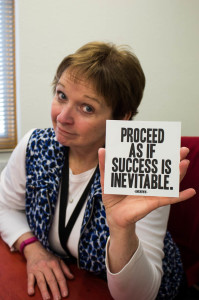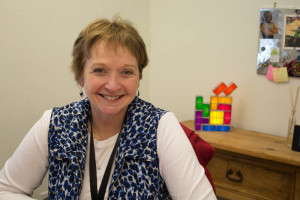Tags
Related Posts
Share This
Seven Things You Need to Know About Career Services

Joanie Spain, Career Services Director, in her office in Mouton Hall. Photo by Christy Marshall
This week marks SFUAD’s Joanie Spain’s fourth year anniversary heading Career Services. She has the energy, passion and organizational skills best equated to Parks and Recs’ Leslie Knope. Spain has accomplished and worked toward this well-oiled machine by offering all kinds of opportunities, including workshops (resume development), internships and strategic networking.
Here are the top seven things you need to know!
1. Your Resume Matters
Career Services hosts many workshops over the span of a school year. Many of these workshops address resume building, formatting, do’s and don’ts, and useful and less well-known information. While building a resume is essential for seniors, everyone benefits from getting a head start.
This presentation and other workshop dates are posted around campus, but Spain is also always available to email or meet in-person in office in Mouton.
2. Arts Bring the Bread & Butter
One particular slide from Spain’s arts career presentation highlights a particularly interesting fact: “Fine Art is a $200 billion industry, annually worldwide. The U.S represents 40% of the Fine Art industry, worldwide…$80 Billion annually.”
Although Spain is not an artist herself, she feels deeply about her purpose–not only to bring in art students but to show everyone that art students are necessary in this “creative economy.”
Later in the same presentation, there is a map of popular careers connected to each major. For Digital Arts and Graphic Design, some of the popular careers include: mobile app designer, art director, character FX artist, mixed media animator, and many more.
“A young professional voice is being called for, everywhere. That’s what artists do. They call people to a deeper understanding of ourselves,” Spain says.
3. Internships Are More Than Just Free Work
Approved internships must include a mentor for the student worker and the internship must benefit the student, not the employer. This is one of the ways a student can gain new skills and new connections.
Spain has a standard list of internships in the area, but is always on the hunt for new ones. If any student is interested in an internship, or just getting more information, she is available to meet.
“Internships work a little differently in each department,” Spain says, “but local employers who want to work with a university student, those calls come to me.” Spain has a process in place to “evaluate those opportunities.”
One difference to note is freelance work. This type of internship is one that does not award the student with credit, but still benefits the student with networking and payment opportunities. Students who undertake freelance work harness and use skills they’ve already learned.
The College Central Network website is another source for finding internships and other opportunities.

Joanie Spain in her office. Photo by Christy Marshall
4. Strategic Networking Is Also A Party
Spain, an avid networker, loves taking students to events in Santa Fe and Albuquerque to give them a taste of their new or soon-to-be work life. She takes film students to various film panels, graphic designers to their fields’ expos, and is eager to find a niche for every major. These opportunities are essential to students so when graduation rolls in they have more information than some of the competition and have an easier transition into work life.
5. Four Year Plans Are Actually Doable
Spain has a simple and achievable four-year plan for students to help organize goals. The gradation of goals is as follows: explore, research, plan, activate. Each header (grade) has a set of items to know and work toward. This document has proven to be an asset to students and can be obtained from Spain via email or in person.
6. Seniors Aren’t Just 55+
Even if a student hasn’t met Spain, all seniors from every department are required to meet with her for a mandatory exit interview. They meet with Spain for 30 to 60 minutes and go over all attributes of leaving the nest and hitting the market.
“We work on a customized job search plan,” Spain says. “We work on resources that are available to them after they graduate, we talk about geographic areas, we talk about goals and how to break that down into bite-size pieces.”
For those who are interested in continuing their education, Spain and the student discuss where, what, how, and all the other details.
7. She Cares!
While Spain knows her stuff, she also works hard in the interest of students, passionately and purposely.
“I’m willing to talk about any subject, it doesn’t have to be about making a resume, it can be about— ‘I’m thinking about changing majors.’ If I’m not the right person to talk to, I’ll get the student to the right person. If you want somebody to bounce ideas off of, or thoughts, or ‘I’m just confused’ or ‘I’m having trouble with my roommate’—anything. Career Services is a safe place, and it’s a confidential place.”






 Jackalope Magazine is the student magazine of Santa Fe University of Art and Design. Building on the interdisciplinary nature of our education, we aim to showcase the talent of our university and character of our city.
Jackalope Magazine is the student magazine of Santa Fe University of Art and Design. Building on the interdisciplinary nature of our education, we aim to showcase the talent of our university and character of our city.
Recent Comments